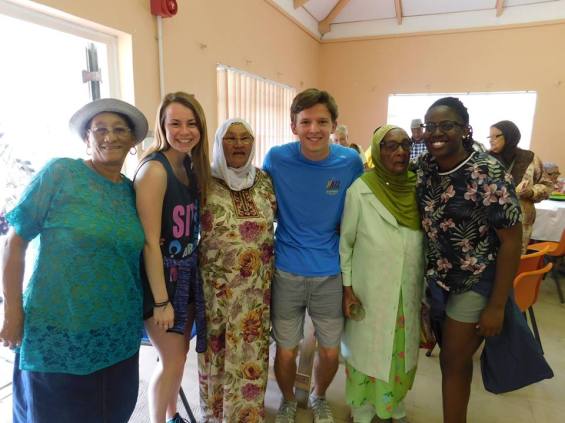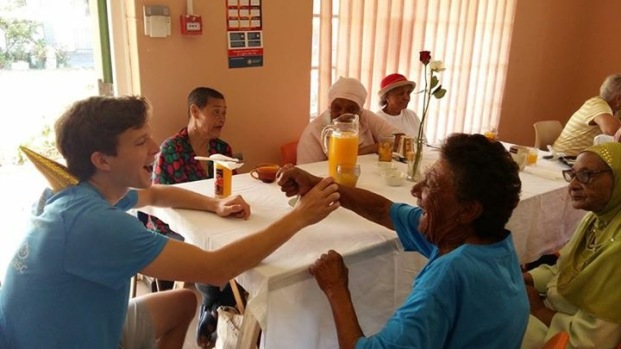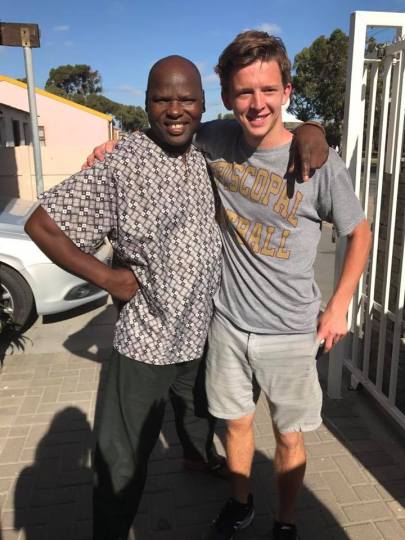Armed revolutions. Warlords. Machetes. Bloody competition for scarce resources. AK-47s. Child Soldiers. Widespread corruption. Genocide.
As I looked out the window of our international flight onto the Ghanaian runway, a flurry of previously latent internalized perceptions of Africa rose to consciousness. It was not the weeds on the runway that uncovered these thoughts. It was not the somewhat shoddy airport, or the hazy sky. The catalyst for my perceptions of a violent and unruly Africa came when my eyes crossed an otherwise mundane occurrence: a black man wearing a beret.
I have not even seen ‘Blood Diamond’ in over half a decade, yet visuals of Captain Poison, a ruthless warlord leading rebel forces in Sierra Leone, permeated uncontrollably through my head. All the two men had in common was the color of their skin and their choice of hat.
That’s when memories of two movies, “Hotel Rwanda” and “Blood Diamond”, showed me that I really had not thought critically about Africa at all prior to the trip (at least not consciously).
I knew all along that these were not very deeply held views of Africa. I would not even call them beliefs. Nonetheless, if this was my impulse reaction was to seeing a black man wearing a beret, what does that represent? How does that play out in my actions?
Quickly I realized I needed to take a deeper look at why these schemas exist in my head and, more importantly, their implications: a decreased willingness to make conversation with local South Africans, and an overly cynical view of the collective morality of African societies.
Similar results of negative impulsive reactions are not unique to me, as research shows. People who score higher negativity scores towards black people on an Implicit Association Test, an activity designed to assess levels of prejudice (racial, in this case), are more likely to have negative experiences with black people than white people (McConnell & Leibold, 2001).
Fortunately, this was not the first time I have been forced to confront my own underlying negative assumptions about groups of people. I have had to check myself when lazy is the first word to pop into my head when I hear African-American. Faggot when I hear gay. Terrorist when I hear Muslim.
I don’t blame myself for such thoughts popping up in my head. They’re often uncontrollable, happening in a split second. What I can control, however, is that I acknowledge the thoughts, reflect on why they surface, and seek advice on how to progress through stereotypes.
Above all, thoughts only gain as much power as my actions allow. Do I move to the other side of the city street when I see a young black male in a hoodie walking towards me? Or do I walk by him and nod? Mahatma Gandhi wastes no words: “Actions express priorities.” How I choose to act following the thought determines how much priority I give to it.
While I try not to internalize guilt for nasty reactionary thoughts, I cannot escape the responsibility tied to them. The responsibility to do others justice, to allow space for people define themselves individually, as Kurt Egelhof, a South African actor/surfer, urged his audience to do in his one-man drama For Generations. Playing his son, a cricket player of color, Kurt directs the other players to play the game fairly so that “I can be who I say I am, not who you say I am.”
But even more so I try to take responsibility because to do so is in my own best interest. Selfish? Probably. But why would we do anything that does not benefit our self in some way or another?
One effective way for me to take responsibility has been to deliberately seek out relationships, or even just brief conversations (as I detail below), with people of varying identities.

The most basic social interactions have benefited me by (1) allowing myself the opportunity to connect positively with people of different identities, (2) challenging and/or fortifying my own deep-seated belief systems, and (3) learning about the plights and triumphs of different cultures and, as a result, exploring new strategies for different struggles.
The people of South Africa provided plenty of opportunities for me to grow in these respects (hopefully they benefited, too).
Angeline, a desk attendant at our hotel in Johannesburg, told me I reminded her of her five-year old son: loud and crazy. She got a snack called nick-nacks at the vending machine every day.
Tatenda, a charming 94-year old woman from Langa, Cape Town’s largest township, beamed proudly of her pilgrimage to Mecca in 2004. She made sure to tell me about the pilgrimage four times throughout our breakfast and bingo shindig. I was happy to listen.

Vatima, a hostess at a restaurant in Kruger National Park, laughed and smiled curiously, “You were the one in the tree, what were you doing up there?”
Lawrence, a waiter at the same restaurant, saw me talking to Vatima and showed me a new handshake. He taught me the greeting, or a ‘dap’ as Americans call it, and said, “meet any black man in South Africa; he’ll know that handshake.” Sure enough his version, which includes a flick of the thumb, was custom everywhere we went in South Africa.
Not all interactions were rainbows and butterflies though, which actually normalized the experience for me. Lawrence, a theatre doorman who emigrated from Senegal, bragged about having a main chick at home, and a side chick who was blowing up his phone—not my cup of tea.
A man who was asking for change on the streets claimed that he did not drink, but he carried a half-full 32 oz. of Castle Lite in plain sight.
Like one would in America, I crossed paths with people whose beliefs fall on varying points of the political spectrum. In reference to the possibility of a positive Trump presidency, one married couple in Cape Town said with a sense of cautious optimism, “You never know.”
A left-leaning tour guide from Johannesburg joked, “Well, you and I now have at least one thing in common: an asshole for a president.”
The dozens of conversations shared between South Africans (or immigrants, in Lawrence’s case) and I ranged from terse to rich, mundane to remarkable.

The self-righteous part of me wants to drop a philosophical bomb of knowledge about my experiences in South Africa, something worthy of a mic drop or a Ted Talk. Just give me the Fulbright now, no application necessary.
Much to my ego’s dismay, however, I return to the states with something less exciting yet perhaps more genuine: a deeper understanding of the cliché “people are more alike than they are different.”
Sure, I knew that people are more similar than they are different. But did I feel that way about South Africa, or Africa as a whole? Is it possible that I simply knew that I was supposed to think that people have more in common than not? At the very least, my prior perceptions of Africa painted a very simplistic picture, one of bloodshed and corruption.
During the Cold War, American literature giant John Steinbeck set out to get to know the people of the Soviet Union, as depicted in his book A Russian Journal. What he found were people not so different from Americans, but quite different from American perceptions. What he found were people afraid of an American attack on Soviet soil, just as Americans feared the opposite.
Recognition of a common humanity is perhaps just as relevant today, especially in the wake of America’s seismic immigration ban.
Shortly after I saw a black man in a beret on a Ghanaian runway, I realized my responsibility—paradoxically microscopic yet significant—to question my assumptions about the people of Africa, and explore a common humanity with whom I encountered.
As I return to “normal” life, Dr. Martin Luther King, Jr. reminds me that the journey is not over. He reminds me to remain awake. In his 1965 address to Oberlin College, Dr. King remarked,
“All too many people find themselves living amid a great period of social change, and yet they fail to develop the new attitudes, the new mental responses, that the new situation demands. They end up sleeping through a revolution.”
I was fortunate enough in South Africa to develop new attitudes and new mental responses born not from Blood Diamond or Hotel Rwanda or Invictus, but from engaging in everyday conversation with everyday South Africans, by remaining awake.
A great period of social change awaits me here at home. Perhaps the challenge now is to continue to remain awake when routine sets in, to stay vigilant when unjust thoughts rise, so that I not only meet the demands of the current revolution, but also do justice to the next black man wearing a beret—whoever that may be.
